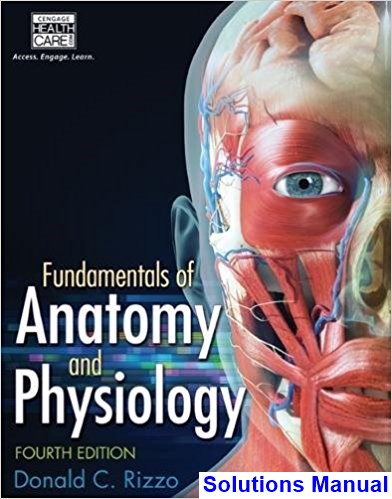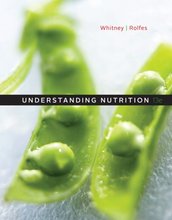This is completed downloadable of Fundamentals of Anatomy and Physiology 4th Edition Rizzo Solutions Manual

Product Details:
- ISBN-10 : 1285174305
- ISBN-13 : 978-1285174303
- Author: Donald C. Rizzo
Packed with vivid illustrations and a wealth of hands-on applications, best-selling FUNDAMENTALS OF ANATOMY AND PHYSIOLOGY, 4E is written specifically for learners in a one-semester introductory A&P course in the allied health field who have little or no previous knowledge of anatomy and physiology. Known for its clear approach to teaching, the text is widely praised for its ability to break A&P down into very simple, easy to understand language. Content is organized according to body systems, and focuses on the body working together to promote homeostasis. Improving both the quality and quantity of text illustrations, the Fourth Edition’s new art program brings text concepts to life with new figures throughout. Designed specifically for the needs of health care programs, the all-new Learning Lab’s interactive simulation program helps learners maximize their success.
Table of Content:
- Chapter 1: The Human Body
- Introduction
- Terms of Direction
- Planes
- Cavities
- Structural Units
- Homeostasis
- Summary Outline
- Review Questions
- Chapter 2: The Chemistry of Life
- Introduction
- Atomic Structure
- Elements, Isotopes, Compounds
- Bonds and Energy
- Common Substances in Living Systems
- Movement of Materials into and out of Cells
- Summary Outline
- Review Questions
- Laboratory Exercise: The Chemistry of Life
- Chapter 3: Cell Structure
- Introduction
- History of the Cell Theory
- Anatomy of a Typical Eukaryotic Cell
- Summary Outline
- Review Questions
- Laboratory Exercise: Cell Structure
- Chapter 4: Cellular Metabolism and Reproduction: Mitosis and Meiosis
- Introduction to Cellular Metabolism
- Cellular Metabolism or Biochemical Respiration
- Anaerobic Respiration
- Production of ATP from General Food Compounds
- Summary of ATP Production from One Glucose Molecule
- Introduction to Cellular Reproduction
- The Structure of the DNA Molecule
- The Cell Cycle
- Meiosis: A Reduction Division
- Gametogenesis: The Formation of the Sex Cells
- A Comparison of Mitosis and Meiosis
- Summary Outline
- Review Questions
- Laboratory Exercise: Cellular Metabolism
- Laboratory Exercise: Cellular Reproduction
- Chapter 5: Tissues
- Introduction
- Epithelial Tissue
- Connective Tissue
- Muscle Tissue
- Nervous Tissue
- Summary Outline
- Review Questions
- Laboratory Exercise: Tissues
- Chapter 6: The Integumentary System
- Introduction
- The Layers of the Skin
- The Accessory Structures of the Skin
- Functions of the Integumentary System
- Summary Outline
- Review Questions
- Laboratory Exercise: The Integumentary System
- Chapter 7: The Skeletal System
- Introduction
- The Functions of the Skeletal System
- The Growth and Formation of Bone
- The Histology of Bone
- The Classification of Bones Based on Shape
- Bone Markings
- Divisions of the Skeleton
- The Axial Skeleton
- The Appendicular Skeleton
- The Arches of the Foot
- Summary Outline
- Review Questions
- Laboratory Exercise: The Skeletal System
- Chapter 8: The Articular System
- Introduction
- The Classification of Joints: Structure and Function
- Movements at Synovial Joints
- The Six Types of Diarthroses or Synovial Joints
- Bursae
- Summary Outline
- Review Questions
- Laboratory Exercise: The Articular System
- Chapter 9: The Muscular System
- Introduction
- The Types of Muscle
- The Anatomy of Skeletal or Striated Muscle
- The Physiology of Muscle Contraction
- The Muscle Twitch
- Muscle Tone
- The Anatomy of Smooth Muscle
- The Anatomy of Cardiac Muscle
- The Naming and Actions of Skeletal Muscles
- The Function and Location of Selected Skeletal Muscles
- Summary Outline
- Review Questions
- Laboratory Exercise: The Muscular System
- Chapter 10: The Nervous System: Introduction, Spinal Cord, and Spinal Nerves
- Introduction
- Organization
- Classification of Nerve Cells
- The Physiology of the Nerve Impulse
- The Synaptic Transmission
- The Reflex Arc
- Grouping of Neural Tissue
- The Spinal Cord
- The Spinal Nerves
- Summary Outline
- Review Questions
- Laboratory Exercise: The Nervous System
- Chapter 11: The Nervous System: The Brain, Cranial Nerves, Autonomic Nervous System, and the Special
- Introduction
- The Principal Parts of the Brain
- The Anatomy and Functions of the Brainstem
- The Anatomy and Functions of the Diencephalon
- The Cerebrum: Structure and Function
- The Cerebellum: Structure and Function
- The Autonomic Nervous System
- The 12 Cranial Nerves and Their Functions
- The Special Senses
- Summary Outline
- Review Questions
- Laboratory Exercise: The Nervous System
- Chapter 12: The Endocrine System
- Introduction
- The Functions of Hormones
- The Classification of Hormones
- The Hypothalamus of the Brain
- The Major Endocrine Glands and Their Hormones
- Summary Outline
- Review Questions
- Laboratory Exercise: The Endocrine System
- Chapter 13: The Blood
- Introduction
- Functions of the Blood
- The Classification of Blood Cells and the Composition of Plasma
- Formation of Blood Cells: Hematopoiesis
- Blood Cell Anatomy and Functions
- The Clotting Mechanism
- The Blood Groups
- Summary Outline
- Review Questions
- Laboratory Exercise: The Blood
- Chapter 14: The Cardiovascular Circulatory System
- Introduction
- The Anatomy of the Heart
- Blood Flow through the Heart
- The Conduction System of the Heart
- A Cardiac Cycle
- Some Major Blood Circulatory Routes
- Anatomy of Blood Vessels
- Major Arteries and Veins of the Body
- Summary Outline
- Review Questions
- Laboratory Exercise: The Cardiovascular System
- Chapter 15: The Lymphatic Circulatory System
- Introduction
- The Functions of the System and the Structure and Functions of the Lymphatic Vessels
- Lymph Circulation
- The Organs of the Lymphatic System
- Immunity
- Antigens and Antibodies
- Cells of the Immune Response and Other Defenses
- Summary Outline
- Review Questions
- Laboratory Exercise: The Lymphatic System
- Chapter 16: Nutrition and the Digestive System
- Introduction
- General Organization
- Histology
- The Mouth or Oral Cavity
- The Salivary Glands
- Teeth
- The Pharynx
- The Esophagus
- The Stomach
- The Pancreas
- The Liver
- The Small Intestine
- The Large Intestine
- The Formation of the Feces
- Summary Outline
- Review Questions
- Laboratory Exercise: The Digestive System
- Chapter 17: The Respiratory System
- Introduction
- The Anatomy and Functions of the Nose
- The Structure and Functions of the Pharynx
- The Larynx or Voice Box
- The Trachea
- The Bronchi and the Bronchial Tree
- The Anatomy and Function of the Lungs
- The Respiration Process
- Lung Capacity
- Summary Outline
- Review Questions
- Laboratory Exercise: The Respiratory System
- Chapter 18: The Urinary System
- Introduction
- Functions of the Urinary System
- The External Anatomy of the Kidneys
- The Internal Anatomy of the Kidneys
- The Anatomy of the Nephrons
- Blood and Nerve Supply to the Nephrons
- Physiology of the Nephrons
- The Ureters: Anatomy and Function
- The Urinary Bladder and the Micturition Reflex
- The Urethra: Male and Female Positions
- Summary Outline
- Review Questions
- Laboratory Exercise: The Urinary System
- Chapter 19: The Reproductive System
- Introduction
- The Male Reproductive System
- The Female Reproductive System
- The Perineum
- The Anatomy and Function of the Mammary Glands
- Pregnancy and Embryonic Development
- Summary Outline
- Review Questions
- Laboratory Exercise: The Reproductive System
- Appendix
- Glossary
- Index





